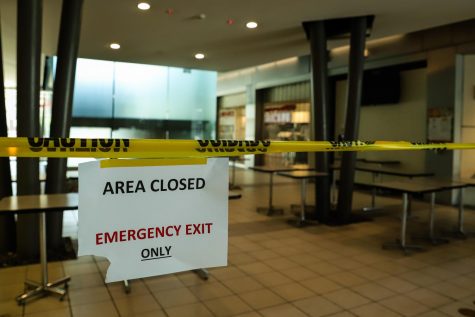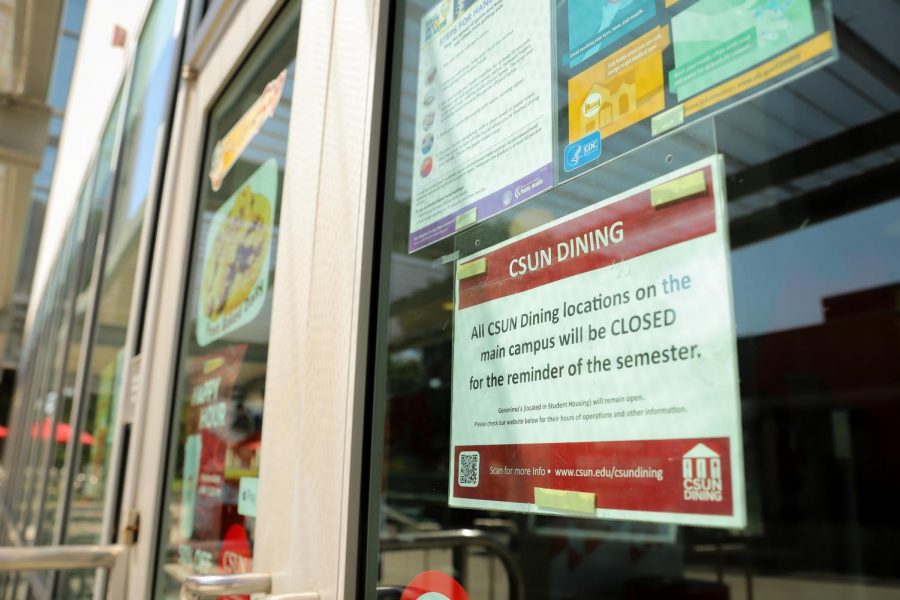The University Corporation takes financial hit; staffing reduced by 90%
The COVID-19 pandemic has forced The University Corporation to close all CSUN dining locations on the main campus.
September 29, 2020
The domino effect of COVID-19 has affected nearly all aspects of CSUN and has put The University Corporation to the test. Over the past six months,TUC executives had to make tough financial decisions to survive.
TUC is a critical part of CSUN’s academia. The organization manages the CSUN campus bookstore, dining venues, meal plans for residence halls, real estate for faculty and staff housing and post-award grant management. TUC is responsible for the licensing of university facilities for events, photo ops and film shoots, as well as licensing university-branded products.
Executive director Rick Evans said that since the change in teaching modality to virtual learning, TUC has laid off 90% of its staff.
Evans said that TUC is responding to the unprecedented financial challenges for the 2019-2020 and 2020-2021fiscal years by managing cash flow, restructuring the workforce and workload consolidation to support TUC’s long-term financial health.

The company is currently operating under both a hiring and wage freeze; remaining TUC staff must take one unpaid furlough day a month for the current fiscal year.
The corporation also reduced how much it contributes to the employee match portion of its retirement program. These actions will reduce overhead expenses, which Evans said is what the company needs right now.
Evans said that if the organization did not take these actions, it would have faced a $2 million deficit instead of the $128,000 year-to-date loss.
TUC is a non-profit 501c(3) auxiliary organization that is tax-exempt from the Internal Revenue Service and is required to be self-supporting.
The corporation operates strictly for the benefit of CSUN and does not receive any financial support from the state of California. Any revenue profits generated are returned to the university for discretionary use.
Evans said there is a limited amount of reserve funding available within the organization, but he anticipates the rainy-day funds will cover any outstanding deficits. He anticipates that as long as classes are virtual, the 2020-2021 fiscal year could potentially cost the company over $400,000 in losses.
When students vacated campus during the spring semester, many canceled their meal plans as well as their housing contracts. Without revenue from food sales, TUC could not continue to pay for food service employees.
Evans confirmed that out of 469 TUC employees, 414 food service workers — of which 59% were CSUN students — were laid off.
All campus dining locations, with the exception of Geronimo’s and the Matador Mercado at student housing, are currently closed.
“There are not enough customers on campus to warrant operating,” Evans said. “El Pollo Loco in the Campus Store Complex made an attempt to be open during the first couple weeks of school but simply didn’t have enough business, and has closed its operation for the foreseeable future.”
With student housing being mostly uninhabited, TUC could not sustain a residential dining program from an operational and financial standpoint. However, CSUN administration requested that TUC find an adequate residential dining program to meet the needs of students who do reside on-campus.
TUC approved a new vendor to handle the residential dining program for CSUN and outsourced all campus dining to Chartwells Higher Education Group.
The food service management company prides itself on “re-inventing the on-campus dining experience.” CHE’s website stated the organization is committed to healthy dining, which includes providing balanced meals, accommodating special dietary needs and makes an effort toward sustainability which is aligned with CSUN’s mission.
“They have a commitment to healthy dining, which includes providing balanced meals and accommodating special dietary requests,” Evans said. “We are excited about how we expect CHE to raise the bars in food and menu quality, customer service, and state of the art technology in the front of house and back of house.”

Evans believes that this change serves as a long-term financial strategy to reduce budget constraints.
“Chartwells has resources that TUC simply doesn’t have to operate in this new environment in a safe and efficient manner,” Evans said. “From the technology to the consistent, high-quality dining experience, Chartwells will deliver the best dining program to CSUN.”
During contract negotiations, TUC requested that CHE commit to hiring former TUC employees. Evans confirmed that 18 members of the culinary staff at Geronimo’s are former TUC employees.
Evans recognizes TUC is operating in an unpredictable situation but is doing what is necessary to ensure the same service standards continue.
“Although TUC’s financial viability will remain somewhat uncertain for the foreseeable future,” Evans said. “I believe the actions taken will allow TUC to preserve infrastructure necessary to continue its mission of supporting CSUN and its students.”
